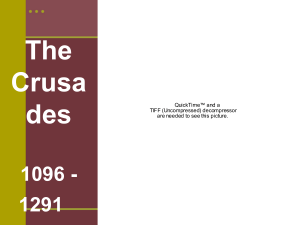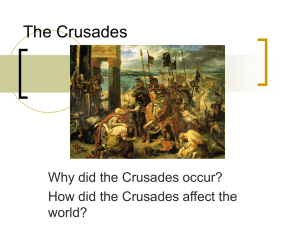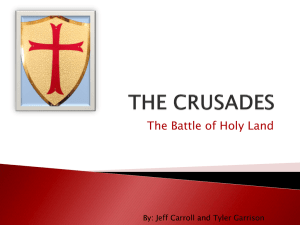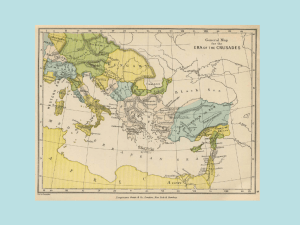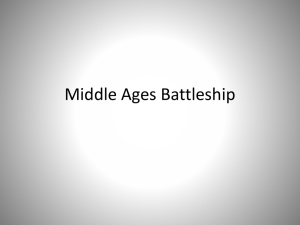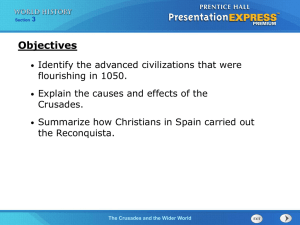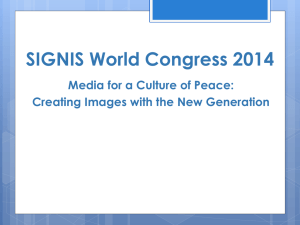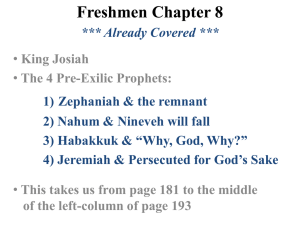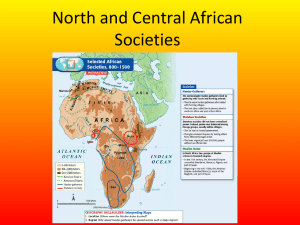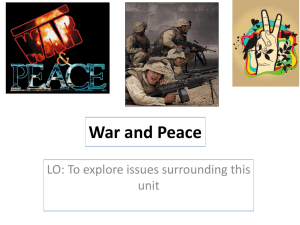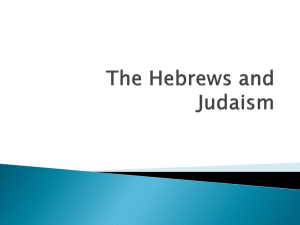From the Crusades to New Muslim Empires
advertisement
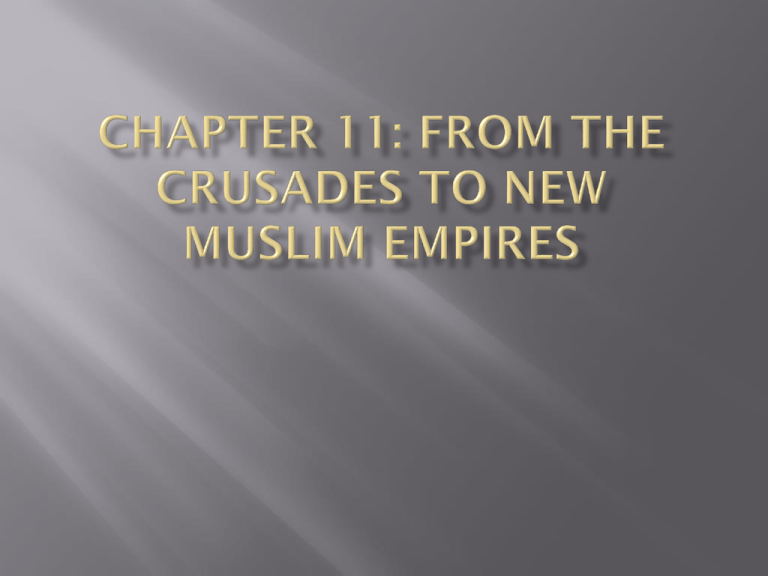
You see pieces of paper/cardboard on the floor You are divided into 3 teams You will win by acquiring “territory” – some part of your body must be touching the “territory” You MAY NOT push, shove or grab one another or move the territory. Line up along the sides of the room All territory is worth 5 points. Only Green team members may occupy the white territory. All territory is worth 5 points. Only Red and Green team members may occupy the white territory. All territory is worth 5 points All teams may occupy the white terriotry White territory is worth 20 points All other territory is worth 5 points All teams may occupy the white territory White territory is worth 50 points. All other territory is worth 5 points The Red team earns points only if they are the only team to occupy the white territory. Other teams may lay claim to it if they have at least four team members touching the white territory. All bets are off – you can do whatever you need to win Get with your group and create a strategy to Due to the fact that someone may get hurt! 1. What reasons does the Pope give for fighting for Jerusalem? What arguments does he use to persuade his listeners to go on a Crusade? 2. What reasons does Saladin give for retaking Jerusalem? What arguments does he use to inspire his listeners? 3. What are the similarities and differences between the arguments the Pope and Saladin use to persuade their listeners? 4. What impressions do these speeches give you about the Crusades? What ideas do the speeches give you about the purposes of the people who fought during the Crusades? How did it feel to play this game? Green team, how did it feel to occupy the white territory? Were your plans in Round 5 justified? Can you think of any time in history when one piece of territory has been considered more important or more desirable than any other and has caused competition and conflict? Crusade – series of religious wars launched against Muslims by European Christians Purpose was to gain control of Palestine – area between Egypt and Syria – ancient homeland of Jews and where Jesus lived – Holy Land 11th century Palestine came under rule of Muslims – Seljuk Turks This alarmed the Byzantine emperor and asked Pope Urban II for help – Pope called on Christians to go on a crusade Muslims were not only targets of crusades – Jews were victims too In this chapter you will: Read the story of the crusades Explore the impact of these wars on Christians, Muslims and Jews Learn how the Muslim empires arose after the crusades and how Islam continued to spread to new parts of the world. PAGE 67 OF YOUR ISN Classroom Competition Over Territory •There were three teams in the game. •One piece of Territory was White •Each team developed plans to control all of the white territory. Historic Competition Over Jerusalem PAGE 67 OF YOUR ISN Classroom Competition Over Territory Historic Competition Over Jerusalem •There were three teams in the game. Members of three faiths lived in the Holy Land, Jews, Christians and Muslims •One piece of Territory was White One City, Jerusalem, was important to people of all three faiths Each team developed plans to control all of the white territory. •European Christians tried to seize control of Jerusalem and the rest of Palestine. This led to a series of religious wars. Look at the graphic organizer on page 119 What do you see? What region does the map show? Where is Europe? Where is Jerusalem in relationship to Europe? How can a map tell a story? What story might this map tell? Read 11.2 and 11.3 and complete page 68 in your ISN Why did European Christians begin going on Crusades at the end of the 11th Century? Jerusalem 1. 11th Century: Seljuk Turks create new Muslim Dynasty in Central Asia. Why did European Christians begin going on Crusades at the end of the 11th Century? Jerusalem 2. Seljuks expand territory west of Syria/Palestine and Anatolia (Byzantine Emp). 1. 11th Century: Seljuk Turks create new Muslim Dynasty in Central Asia. Why did European Christians begin going on Crusades at the end of the 11th Century? Jerusalem 3. Expansion worries Christians in Europe about the Holy Lands and Jerusalem. 2. Seljuks expand territory west of Syria/Palestine and Anatolia (Byzantine Emp). 1. 11th Century: Seljuk Turks create new Muslim Dynasty in Central Asia. Why did European Christians begin going on Crusades at the end of the 11th Century? Jerusalem 4. Safety of Jerusalem and Palestine suffers; pilgrimages are no longer safe. 3. Expansion worries Christians in Europe about the Holy Lands and Jerusalem. 2. Seljuks expand territory west of Syria/Palestine and Anatolia (Byzantine Emp). 1. 11th Century: Seljuk Turks create new Muslim Dynasty in Central Asia. Why did European Christians begin going on Crusades at the end of the 11th Century? Jerusalem 5. Palestine falls to Seljuks. Impossible to travel there safely (robbery, killing) 4. Safety of Jerusalem and Palestine suffers; pilgrimages are no longer safe. 3. Expansion worries Christians in Europe about the Holy Lands and Jerusalem. 2. Seljuks expand territory west of Syria/Palestine and Anatolia (Byzantine Emp). 1. 11th Century: Seljuk Turks create new Muslim Dynasty in Central Asia. Why did European Christians begin going on Crusades at the end of the 11th Century? 5. Palestine falls to Seljuks. Impossible to travel there safely (robbery, killing) 4. Safety of Jerusalem and Palestine suffers; pilgrimages are no longer safe. 3. Expansion worries Christians in Europe about the Holy Lands and Jerusalem. 2. Seljuks expand territory west of Syria/Palestine and Anatolia (Byzantine Emp). 1. 11th Century: Seljuk Turks create new Muslim Dynasty in Central Asia. Jerusalem 6. All events pave way for Crusades. Christians: War will end Muslim expansion. Response to threat posed by Seljuks Pope called Christians to help protect the Holy Land – promised entry into Heaven French speaking nobles organized armies to join the fight – trained knights, townspeople and peasants Many wore red crosses – many joined for money and trade and to gain estates in the Holy Land Four Nobles led the 1st crusade 30,000 crusaders fought through Anatolia to Palestine June 1098 laid siege to Antioch- Antioch fell to the Christians Next June (1099) the city surrendered Victors massacred Muslims and Jews – survivors were sold into slavery Some crusaders stayed – Palestine, Syria, Lebanon and Turkey First victory owed to lack of Muslim unity 1144 Muslims captured Edessa, Crusader capital – Christians start 2nd Crusade Ended in failure German army beaten French army – beaten at Damascus and marched home Muslims began to unite and came under same leadership Salah al-Din, Called Saladin, formed largest Muslim empire since Seljuks – united Egypt, Syria and lands to the east Took back most of Palestine -1187 Captured Jerusalem – did not kill prisoners, either sold for ransom or slavery King Richard I of England led fight against Salah al-Din Richard captured Palestinian town of Acre Wanted to exchange prisoners, Richard thought Salah al-Din was taking too long so killed his Muslim prisoners Signed a peace treaty in 1192 Continued for 100 years 1212 tens of thousands of peasant children from France and Germany marched in a “Children’s Crusade” Few reached the Holy Land None succeeded in recapturing Jerusalem Muslims gained back land they lost Christians launched to retake the Iberian Peninsula (Spain and Portugal) from Muslims Christian leaders slowly took Muslim lands from them By 1248 only a small amount of land remained Muslim Many Jews and Muslims remained in Christian controlled lands 1400s Queen Isabella and King Ferdinand wanted to unite Spain Inquisition – church court Used against Muslims and Jews Harsh to people who thought were practicing their old religion 170,000 Jews left Spain – didn’t want to become Catholic Spain got rid of remaining Muslims and Jews 1st 1096- Started by the Christians 1099 fearful over C.E. Jerusalem. Christians win, take over Jerusalem. 2nd 11461148 C.E. Muslims defeat Germans and French into retreat, retake lands lost in 1st Crusade. Muslims band together and fight off Christians. Unhappy, they start another one. 3rd 11891192 C.E. Muslims, banded together again, Europe enraged, begin 3rd Crusade. After 1192 peace treaty, Christians keep cities along the coast of Palestine. Muslims allow Christian pilgrims to enter Jerusalem. Elements of the 3rd Crusade still present today. Christians suffered terrible effects of the war Wounded or killed and battles or died from disease or hardship of travel Economic changes – need to pay for suplies, increased use of money in Europe, knights perform banking functions, Kings started taxing Society – monarchs grew more powerful as nobles and knights left home – helped to end feudalism Contact with Eastern Cultures – learned about new foods and other goods, dressed in clothes made of muslin – cotton fabric Developed a taste for melons, apricots and other foods Spices Muslims lost lands and did not gain as much as Christians Many Muslims lost their lives and Muslim property was destroyed Gained exposure to new weapons and adopted a standing army Earned riches from trade Muslims politically started banding together You will be given a group Each group gets Preparing for a Historical Symposium on the Crusades handout Historical Figure Mask Each person gets Matrix of Historical Figures You will use these biographies and 11.4-11.6 to bring to life a prominent crusades-era figure for the symposium In your group: Assign Roles: Public Relations Agent, Actor, Historian, and Production Designer You may have 1 person doing 2 roles or 2 people filling 1 role depending on how many are in your group Read the bio information on your character Use 11.4-11.6 Guided Reading to help you as well Jews suffered greatly Were slaughtered and some became slaves Worsened the lives of Jews Murdered whole communities Destroyed Synagogues and holy books Tried to make them accept Christianity Anti-Semitism – prejudice against Jews Jews could not hold public office Their businesses were taken by the Christians Jews were forced to be segregated and live in crowded neighborhoods called ghettos – walled or gated areas of town DESCRIBE THIS FIGURES CRUSADE EXPERIENCE. WHAT RELIGION IS THIS FIGURE? Richard I Christian. Taxed people heavily. Ruthless and brave. Courage and honor. Anna Christian. Respected Crusaders as Christians but Comnena thought they were dangerous. Wondered if they were truly fighting for God – thought some just wanted wealth, land and glory Salah al- Muslim. Leader during Crusades. Organized Muslims Din – fair and strong leader. Courtesy and militarily skilled DESCRIBE THIS FIGURES CRUSADE EXPERIENCE. WHAT RELIGION IS THIS FIGURE? Usamah ibnMunquidh Elieer ben Nathan Eleazar ben Judah Muslim. Respected others for faith in one God but thought it was his duty to fight against them. Wrote a valuable account of the crusades from Muslim point of view. Jewish. Community destroyed. Jews killed themselves rather than give up religion. Hated crusaders Jewish. Lived in Germany. Wife and 3 children were killed – preached for love of all humanity but wondered if the Jewish would survive Europe Empire Founded Ended Location (pres.) Mongol Rule Mid Mid 1200s 1300s Persia Mongolia China Arabia Ottoman Safavid Mughal Interesting Fact Add as best you can to your map on page 69 ISN! Mongol Rule Ottoman Empire Safavid Empire Mughal Empire 1. How large was the Ottoman Empire? 2. What places did the Ottoman Empire conquer? 3. How and why did the Ottomans used millets to rule their empire? 4. Where did the Safavids rule? 5. How were they different from the Ottomans? 6. Where was the Mughal Empire located? 7. Based on your studies in 6th grade, what religious group competed with Islam in India under the Mughals and after? 8. What countries and continents were affected by the spread of Islam by 1700?
